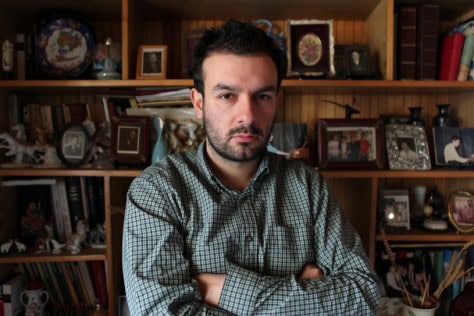Neil LaBute’s newest play, Reasons To Be Pretty, is currently up at the MCC Theater at Lucille Lortel in New York. The director, playwrite, and professional button-pusher brings us a story of couples torn apart by the tangled demands of physical beauty. (Audiences will be quick to recognize film actress Piper Perabo, who plays a dashing grocery store security guard). LaBute always delights and surprises, whether he’s inverting the plot of cult classic Wicker Man or darkening the heart of black comedy with films like Your Friends & Neighbors. We spoke with him about the high comedy of Nicolas Cage in a bear suit, why being labeled a misogynist is boring, and how beautiful people deserve our empathy.
Reasons to be Pretty caps off the thematic trilogy begun by two previous plays: Fat Pig and The Shape of Things, which was also adapted into a film. What thread ties the three works together?
One of the many loose themes behind the 'beauty' trilogy, as I've jokingly called it, is the ugliness that we're capable of spreading to other people in our lives and relationships if we're not careful. Sometimes this is overtly stated—say, in a piece like Fat Pig, where the protagonist literally bows to the pressure of his peers—and in subtler ways as well, as in how the daily pressure of trying to survive economically in a blue collar world preys on the characters in Reasons To Be Pretty. To stand out or stand up for what you believe in is always a difficult thing to do. It's easy to say shit in class or on the phone; it's a completely different game when you're staring at the nightsticks of some riot police or choosing to stand in front of a moving tank. I wanted these plays to look at how hard it is for the individual to take a stand in the difficult days of conformity; that includes the artist, the student, the businessman, and the dock worker.
Should we really feel pity, or empathy, for pretty people? The actress Mischa Barton once got lambasted for suggesting she had it tough being attractive, yet the character of Carly [Piper Perabo] asks us to understand her own plight as a hot woman in America. Is beauty really a liability?
Hell yes—we should feel empathy for everybody! That's the idea behind the word after all; even if we haven't experienced what ‘Carly’ expresses (or what the actress playing her no doubt experiences as well), we should take the time and listen to her and understand that it's been a problem for her. Believe her and feel for her.
I'm not saying stop giving money to Darfur and start coddling beautiful actresses—[but] who am I to say that problems don't come in all shapes and sizes? Get yourself a stalker and see how cool that is to live with. A problem is a problem, no matter how great or small. The idea is to fix it, not to rank it in order.
Beauty is a liability if it becomes one. We're drawn to it, we desire it, we often begin to despise it if we can't have it. How fun does that sound?
Are we entering the era of a kinder, gentler Neil LaBute? Despite all the media scribbling about Reasons To Be Pretty, the play ends on a fairly optimistic, almost sentimental note—and that’s not a bad thing. Are you feeling less dark about the state of the world—and the way human beings relate to each other—these days?
It's a funny thing listening not just to the critical community respond to this new play but also the audience at large—they want to see this brighter, more hopeful ending as a sign that I'm maturing as a person or growing up. Maybe that is the case but it doesn't feel like it to me. It felt like the right ending to this particular play, and that's the thing that's most important to me as a writer: be fair to the characters and plot that you've created. End a play how it should end, not how the audience wants it to end.
The ironic thing about it is that what is currently onstage is not even the original ending that I wrote; the preview process lead us to create something more emotional (and right) for the character of “Greg,’ rather than the more informational ending I first wrote. I'm extremely happy with the play and especially the production that Terry Kinney has put up on the stage, but I'm afraid it doesn't make me a changed man. If the next play needs to end with a baby eaten by wolves, so be it.
Reasons To Be Pretty is set in a very unglamorous, working class environment—a grocery store, to be exact. Much of the action takes place either within the store’s break room or in similarly unromantic locales, such as the food court of the local mall. Why was it important that your characters came from this background, which is obviously quite different from your own? Why couldn’t Reasons To Be Pretty have been about art professors at Yale, or two couples on the Upper East Side?
The world may be decidedly different from the world that I live in now, but it's extremely close to the world that I grew up in. My father was a truck driver and a Teamster and I was around the blue-collar work force for most on my childhood. It is not just familiar to me, it's actually comforting in many ways–I'm as happy sitting at a truck stop as I am a four star restaurant. More so, probably. Do I love that world? No, not necessarily, but I understand it and I'm comfortable in it. The world of Reasons To Be Pretty was pretty purposeful—these bleak spaces are the hard realities of many people out their today living from paycheck to paycheck. I knew what it was like to want to escape that world and so it made it fairly easy to understand how “Greg's” journey needed to be mapped out.
It was also important for me not to repeat myself—I've written a number of works that take place in the white-collar business environment and I wanted this play to feel different. This trilogy now features a university setting, a business setting and this blue-collar factory. I think that basically covers the world as I know it.
Does it bother you that many people outside the “professional” theater world still feel the need to include the adjective “misogynist” or “sadistic” when discussing your work, which they may or may not have ever seen? Why do you think your plays and films get under people’s skin to such a degree?
It's boring more than anything—it doesn't allow for growth or new dialogue about my work or for simple misinterpretation. Most of the 'misogynist' label first came about from people who hadn't even seen my first film [In The Company Of Men] but decided to label the work with that moniker anyway. I've fought against the word for a decade now, and not because it's such an awful thing–i don't think 'misogynist' would be in my Top Five worst things to be labeled—but just because it's not true.
As far as my work getting under people's skin, that to me seems to be the job as I understand it. I'm a storyteller and I get paid to take people on a little fictional journey every so often that is different than anything else they've gone on before—it should be funny and thrilling and scary and dramatic and breathtaking and if I can make you keep thinking about it a week later then I will. That doesn't seem like a crime, it seems like the job description of what I signed on for. People's lives are safe enough—boring, mostly. It's good that a play or movie can come along and stir things up every once in a while.
Your remake of Wicker Man caused a predictable controversy—fans of the cult classic were simply appalled that anyone was attempting to redo the material, let alone with significant changes to the storyline. How would you convince a true believer of the original to see your version, which is now available on DVD?
Yeah, I didn't realize what a 'beloved' classic it was until I re-imagined it recently! I still believe it's one of those things that people remember more fondly than if they were to watch it again. It's not a horror movie, was never meant to be, but instead it is a slow, creepy picture with some terrifically goofy local music and fun performances and an ending that knocks you out. That's what people remember when they call it horror; the ending is actually pretty horrific. When I got involved it was with the understanding of taking it to some new place–I turned the story on its ear while remaining true to the spirit of the thing while also playing with the 'misogynist' label that I'd been carrying for years.
People seemed to think that we didn't get it when Nicolas Cage was running around in a bear suit–I know when something is funny. The great thing is that no matter how many women he hits and kicks, how silly it is that he disguises himself as a bear, we still put the guy inside the Wicker Man and burn him to death. The movie takes a pretty sober turn and that was half the fun of it for me. Always stay a step ahead of the audience and whack them across the knuckles whenever possible.
What can we expect next in terms of your film career?
The most immediate thing is that I have a film coming out in September called Lakeview Terrace. It's a slow-burn dramatic thriller that features Samuel Jackson as an L.A. cop who doesn't like the mixed-race couple (played wonderfully by Patrick Wilson and Kerry Washington) who move in next door to him. It's not so much about race–although that can't help but figure into it–but about how we react when confronted by the very things that we believe will keep us safe. What do you do when you can't go to the police? I thought it was kind of a fascinating idea and am really happy with the results—the actors are all terrific in it and I think it's a tight, dirty little picture. In the long run I feel like the past is prologue—many of my favorite filmmakers (Rohmer, Antonioni, Haneke, etc.) began to hit their stride at the age
I am now. I hope that I can continue to work frequently in the theater but I want to continue making films that I'm proud of and have something to say beyond the fact that they do or don't make money on their opening weekend. I love films and I want to make films that people love; not feel-good pictures but pictures that keep you up at night and thinking about them a week later. In this world of instantly disposable entertainment, that would be a feat indeed.
Reasons To Be Pretty is available in paperback beginning June 24th. The play is up at MCC Theater until July 5th; more information and tickets here. And check out the New York magazine interview with one of the play’s stars, Piper Perabo.
 Q&A with Larry Gus
Q&A with Larry Gus We Own the Night: The Edison
We Own the Night: The Edison
No Comments